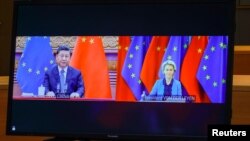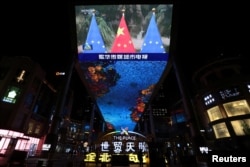The first European Union-China summit in nearly two years took place Friday by video link and lasted just two hours.
The European Union warned China not to support Russia's war in Ukraine or interfere with international sanctions against Moscow, during a virtual summit that failed to ease sharp differences between the sides over the conflict.
Speaking after the meeting, European Commission chief Ursula von der Leyen offered this assessment of what EU officials described as frank and open discussions on Russia's war in Ukraine: "Frank and open means we exchanged very clearly opposing views. This is not a conflict, this is a war. This is not a European affair, this is a global affair."
The EU has called on China to pressure Russia to end the war — or at least open humanitarian corridors in Ukraine — saying that as a permanent member of the U.N. Security Council, Beijing had a special responsibility to act.
"So we also made very clear that China should, if not support, at least not interfere with our sanctions," von der Leyen said. "We discussed that and also the fact that no European citizen would understand any support to Russia's ability to wage war. Moreover, it would lead to a major reputational damage for China here in Europe."
EU officials also warn that undermining sanctions on Russia could trigger economic consequences. Von der Leyen noted the EU and China trade roughly $2.2 billion worth of goods and services every day — compared with just over $364 million between Russia and China. Meanwhile, European and other Western companies are suspending operations or exiting Russia over the war.
"The business sector is watching very closely the events and evaluating how countries are positioning themselves," von der Leyen said. "This is a question of trust, of reliability and, of course, of decisions on long-term investments."
China has tried to cast itself as a neutral player in the Ukraine war, while also trying to strengthen strategic ties with Moscow and keep its economic ones with Europe on track. Chinese state broadcaster CCTV reported President Xi Jinping saying he hoped the EU could form its view of China "independently."
Analysts described Friday's summit as "frosty" and said China was concerned about the closer relations between Europe and the U.S. in recent months.
Ties between the EU and China have been increasingly strained in recent years over issues including Taiwan and China's human rights record. Both were addressed at the summit, along with areas where more cooperation is possible, including climate change and COVID-19 vaccines.
EU officials also called on China to stop barring imports from member state Lithuania over its warming ties with Taiwan.






